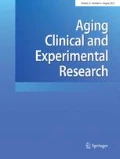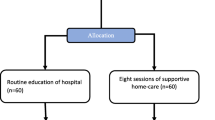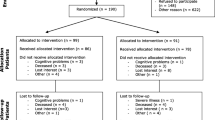Abstract
Dependence of stroke survivors regarding the ability to perform activities of daily living imposes a burden on family caregivers. The study evaluated the effect of the family-centered empowerment program on the ability of Iranian patients with stroke to perform activities of daily living, as well as on family caregiver burden. In this randomized controlled trial study, a total of 90 pairs of patients with stroke and their family caregivers was selected and randomly assigned to the intervention or control groups. Patients and their family caregivers participated in four family-centered empowerment program sessions over four consecutive days while the patient was hospitalized. The difference in the ability of patients with stroke in the intervention and control groups to perform activities of daily living was not significant 2 weeks after the intervention. However, the ability of patients with stroke in the intervention group to perform activities of daily living increased significantly 2 months after the intervention compared with the control group: 66 ± 35.95 and 51.31 ± 36.28, respectively (p = 0.047). Two weeks after the intervention, the family caregiver burden significantly decreased in the intervention group (29.55 ± 15.38) compared with the control group (38.77 ± 18.53 and p = 0.012). The burden in the intervention group also decreased 2 months after the intervention compared with the control group: 22.95 ± 15.68 and 36.11 ± 18.88, respectively (p < 0.001). Nurses can use the family-centered empowerment program to improve the quality of life of patients with stroke, and to reduce the burden of family caregivers.


Similar content being viewed by others
References
Gbiri CA, Olawale OA, Isaac SO (2015) Stroke management: informal caregivers’ burdens and strains of caring for stroke survivors. Ann Phys Rehabil Med 58:98–103. https://doi.org/10.1016/j.rehab.2014.09.017
Hekmatpou D, Baghban EM, Dehkordi LM (2019) The effect of patient care education on burden of care and the quality of life of caregivers of stroke patients. J Multidiscip Healthc 12:211. https://doi.org/10.2147/JMDH.S196903
Jaracz K, Grabowska-Fudala B, Górna K et al (2014) Caregiving burden and its determinants in Polish caregivers of stroke survivors. Arch Med Sci 10:941. https://doi.org/10.5114/aoms.2014.46214
Caro CC, Mendes PVB, Costa JD et al (2017) Independence and cognition post-stroke and its relationship to burden and quality of life of family caregivers. Top Stroke Rehabil 24:194–199. https://doi.org/10.1080/10749357.2016.1234224
Yilmaz CK, Aşiret GD, Çetinkaya F et al (2019) Effect of progressive muscle relaxation on the caregiver burden and level of depression among caregivers of older patients with a stroke: a randomized controlled trial. Jpn J Nurs Sci 16:202–211. https://doi.org/10.1111/jjns.12234
Zhu W, Jiang YA (2018) Meta-analytic study of predictors for informal caregiver burden in patients with stroke. J Stroke Cerebrovasc Dis 27:3636–3646. https://doi.org/10.1016/j.jstrokecerebrovasdis.2018.08.037
Etemadifar S, Heidari M, Jivad N et al (2018) Effects of family-centered empowerment intervention on stress, anxiety, and depression among family caregivers of patients with epilepsy. Epilepsy Behav 88:106–112. https://doi.org/10.1016/j.yebeh.2018.08.030
Minooei MS, Ghazavi Z, Abdeyazdan Z et al (2016) The effect of the family empowerment model on quality of life in children with chronic renal failure: children’s and parents’ views. Nephrourol Mon. https://doi.org/10.5812/numonthly.36854
Alhani F (2003) Evaluating of family-centered empowerment model on preventing Iron deficiency anemia. Tehran, Iran. (Persian): PhD Dissertation, Tarbiat Modares University
Vahedian-Azimi A, Miller AC, Hajiesmaieli M et al (2016) Cardiac rehabilitation using the family-centered empowerment model versus home-based cardiac rehabilitation in patients with myocardial infarction: a randomised controlled trial. Open Heart 3:e000349. https://doi.org/10.1136/openhrt-2015-000349
Legg LA, Lewis SR, Schofield-Robinson OJ et al (2019) Occupational therapy for adults with problems in activities of daily living after stroke. Cochrane Database Syst Rev 7:CD003585. https://doi.org/10.1002/14651858.CD003585.pub3
Blomgren C, Samuelsson H, Blomstrand C et al (2019) Long-term performance of instrumental activities of daily living in young and middle-aged stroke survivors—impact of cognitive dysfunction, emotional problems and fatigue. PLoS One 14:e0216822. https://doi.org/10.1371/journal.pone.0216822
Rejnö Å, Nasic S, Bjälkefur K et al (2019) Changes in functional outcome over 5 years after stroke. Brain Behav 9:e01300. https://doi.org/10.1002/brb3.1300
Ogunlana MO, Dada OO, Oyewo OS et al (2014) Quality of life and burden of informal caregivers of stroke survivors. Hong Kong Physiother J 32:6–12. https://doi.org/10.1016/j.hkpj.2013.11.003
Pitthayapong S, Thiangtam W, Powwattana A et al (2017) A community based program for family caregivers for post stroke survivors in Thailand. Asian Nurs Res 11:150–157. https://doi.org/10.1016/j.anr.2017.05.009
Araújo O, Lage I, Cabrita J et al (2015) Intervention in informal caregivers who take care of older people after a stroke (InCARE): study protocol for a randomised trial. J Adv Nurs 71:2435–2443. https://doi.org/10.1111/jan.12697
Ganapathy V, Graham GD, DiBonaventura MD et al (2015) Caregiver burden, productivity loss, and indirect costs associated with caring for patients with poststroke spasticity. Clin Interv Aging 10:1793. https://doi.org/10.2147/CIA.S91123
Masoudian N, Sarmadi M, Najafi R et al (2019) Burden of care and quality of life in home caregivers of patients with stroke in Iran. Home Health Care Manag Pract 12:211–217. https://doi.org/10.1177/1084822319843137
Vahedian-Azimi A, Miller AC, Hajiesmaieli M et al (2016) Cardiac rehabilitation using the family-centered empowerment model versus home-based cardiac rehabilitation in patients with myocardial infarction: a randomized controlled trial. Open Heart 3:e000349. https://doi.org/10.1136/openhrt-2015-000349
Hakim A, Palizban E, Ahmadi Angali K (2015) The effect of family-centered empowerment model on the level of parents’ knowledge of children with ostomy. J Pediatr Nurs 1:22–31 (in Persian)
Vahedian-Azimi A, Alhani F, Goharimogaddam K et al (2015) Effect of family-centered empowerment model on the quality of life in patients with myocardial infarction: a clinical trial study. J Nurs Educ 4:8–22 (in Persian)
Teymouri F, Alhani F, Kazemnejad A (2014) The effect of the family-centered empowerment model on the quality of life in parents of children with asthma. Vicenna J Nurs Midwifery Care 22:5–14 (in Persian)
Sanaie N, Nejati S, Zolfaghari M et al (2013) The effect of family-centered empowerment in self efficacy and self-esteem in patients undergoing coronary bypass graft surgery. J Res Dev Nurs Midwifery 10:44–53 (in Persian)
Azimi R, Mohammadi F, Hosseini M et al (2013) The effect of home-based stroke rehabilitation on quality of life of stroke survivors and their family caregiver’s strain. Evid Based Care 3:77–85. https://doi.org/10.22038/EBCJ.2013.729
Banks JL, Marotta CA (2007) Outcomes validity and reliability of the modified Rankin scale: implications for stroke clinical trials: a literature review and synthesis. Stroke 38:1091–1096. https://doi.org/10.1161/01.STR.0000258355.23810.c6
Quinn T, Dawson J, Walters M (2008) Dr John Rankin; his life, legacy and the 50th anniversary of the Rankin stroke scale. Scott Med J 53:44–47. https://doi.org/10.1258/RSMSMJ.53.1.44
Greco A, Pancani L, Sala M et al (2017) Psychometric characteristics of the caregiver burden inventory in caregivers of adults with heart failure. Eur J Cardiovasc Nurs 16:502–510. https://doi.org/10.1177/1474515117693890
Novak M, Guest C (1989) Application of a multidimensional caregiver burden inventory. Gerontologist 29:798–803
Abbasi A, Asayesh H, Rahmani H et al (2011) The burden on caregivers from hemodialysis patients and related factors. J Res Dev Nurs Midwifery 8:26–33 (in Persian)
Quinn TJ, Langhorne P, Stott DJ (2011) Barthel index for stroke trials: development, properties, and application. Stroke 42:1146–1151. https://doi.org/10.1161/STROKEAHA.110.598540
Duffy L, Gajree S, Langhorne P et al (2013) Reliability (inter-rater agreement) of the Barthel index for assessment of stroke survivors: systematic review and meta-analysis. Stroke 44:462–468. https://doi.org/10.1161/STROKEAHA.112.678615
Oveisgharan S, Shirani S, Ghorbani A et al (2006) Barthel index in a Middle-East country: translation, validity and reliability. Cerebrovasc Dis 22:350–354. https://doi.org/10.1159/000094850
Dehghan nayeri N, Mohammadi S, Pedram razi S et al (2015) Effectiveness of family empowerment program on level of adherence to treatment regimens in stroke patients; a randomized controlled trial. Evid Based Care 5:57–66. https://doi.org/10.22038/EBCJ.2015.4072
Teo SH, Chen Z (2016) Effectiveness of an activity-based home therapy program for stroke patients in Singapore. Arch Phys Med Rehabil 97:e15. https://doi.org/10.1016/j.apmr.2016.09.039
Wang T-C, Tsai AC, Wang J-Y et al (2015) Caregiver-mediated intervention can improve physical functional recovery of patients with chronic stroke: a randomized controlled trial. Neurorehabilitation Neural Repair 29:3–12. https://doi.org/10.1177/1545968314532030
Bertilsson A-S, Eriksson G, Ekstam L et al (2016) A cluster randomized controlled trial of a client-cantered, activities of daily living intervention for people with stroke: 1 year follow-up of caregivers. Clin Rehabil 30:765–775. https://doi.org/10.1177/0269215515603780
Masoodi R, Soleimani MA, Alhani F et al (2013) Effects of family-centered empowerment model on perceived satisfaction and self-concept of multiple sclerosis patients care givers. Koomesh 14:240–248 (in Persian)
Araújo O, Lage I, Cabrita J et al (2016) Telephone assistance to decrease burden in informal caregivers of stroke older people: monitoring and diagnostic evaluation. BMC Health Serv Res 16:92
Vloothuis J, Mulder M, Nijland RH et al (2015) Caregiver-mediated exercises with e-health support for early supported discharge after stroke (CARE4STROKE): study protocol for a randomized controlled trial. BMC Neurol 15:193. https://doi.org/10.1186/s12883-015-0440-z
Graf R, LeLaurin J, Schmitzberger M et al (2017) The stroke caregiving trajectory in relation to caregiver depressive symptoms, burden, and intervention outcomes. Top Stroke Rehabil 24:488–495. https://doi.org/10.1080/10749357.2017.1338371
Forster A, Dickerson J, Young J et al (2013) A cluster randomized controlled trial and economic evaluation of a structured training programme for caregivers of inpatients after stroke: the TRACS trial. Health Technol Assess 17:1. https://doi.org/10.3310/hta17460
Cameron JI, O’Connell C, Foley N et al (2016) Canadian stroke best practice recommendations: managing transitions of care following stroke, guidelines update 2016. Int J Stroke 11:807–822. https://doi.org/10.1177/1747493016660102
Grove SK, Burns N, Gray J (2014) Understanding nursing research: building an evidence-based practice. Elsevier, Amsterdam
Ashghali Farahani M, Ghane G, Sydfatemi N et al (2016) Effect of educational program on the burden of family caregivers of hemodialysis patients. Evid Based Care 6:7–18. https://doi.org/10.22038/EBCJ.2016.6703
Author information
Authors and Affiliations
Corresponding author
Ethics declarations
Conflict of interest
On behalf of all authors, the corresponding author states that there is no conflict of interest.
Statement of human and animal rights
All procedures performed within this study were in accordance with the ethical standards of the institutional research ethics committee and with the 1964 Helsinki declaration and its later amendments or comparable ethical standards.
Informed consent
Informed consent was obtained from all individual participants included in the study.
Additional information
Publisher's Note
Springer Nature remains neutral with regard to jurisdictional claims in published maps and institutional affiliations.
Rights and permissions
About this article
Cite this article
Deyhoul, N., Vasli, P., Rohani, C. et al. The effect of family-centered empowerment program on the family caregiver burden and the activities of daily living of Iranian patients with stroke: a randomized controlled trial study. Aging Clin Exp Res 32, 1343–1352 (2020). https://doi.org/10.1007/s40520-019-01321-4
Received:
Accepted:
Published:
Issue Date:
DOI: https://doi.org/10.1007/s40520-019-01321-4




